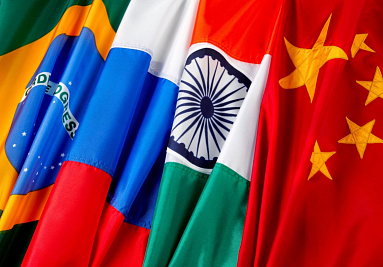Russian Ministry of Economic Development: BRICS countries plan to create an international association of special economic zones
Russia chaired the second meeting of the BRICS contact group on trade and economic issues this year. Over the course of two days, specialists from relevant departments of all member countries of the association discussed a number of initiatives in a conference call format, which will be submitted to the BRICS Ministers of Economy and Foreign Trade for approval in July.
On the first day of the meeting, the parties discussed issues of promoting digital transformation and integrating digital solutions into everyday business processes in the BRICS space.
"One of the most important initiatives of the Russian BRICS presidency in 2024 is the use of artificial intelligence to optimize trade chains, search for new market niches and simplify business," said Nikita Kondratiev, Director of the Department of Multilateral Economic Cooperation and Special Projects at the Ministry of Economic Development of the Russian Federation. "In Russia alone, the effect of the introduction of artificial intelligence into the economy by 2030 is estimated at 11.2 trillion rubles."
The participants of the meeting unanimously recognized that the development of e-commerce is impossible without tools for pre-trial settlement of online disputes, inclusiveness and openness of national marketplaces for products of small and medium-sized enterprises from the BRICS countries.
During the meeting, the parties supported the proposal of the Ministry of Economic Development of Russia and the Association of Clusters, Technoparks and SEZS of Russia on cooperation in the field of special economic zones. The BRICS countries expressed their willingness to exchange effective models for managing territories with preferential treatment and, in the future, to develop common standards for SEZ activities. The creation of the BRICS International Association of Special Economic Zones is under negotiation.
On the second day of the meeting, the parties discussed the development of small and medium-sized enterprises in BRICS and the practice of using mechanisms to support SMEs. Russian government programs to support SMEs, for example, include a comprehensive set of tools that allow entrepreneurs to fully realize their export potential from the idea to the conclusion of a contract. First of all, they are aimed at financial support for businesses, adaptation of SMEs to the requirements of foreign markets, search for partners and buyers, as well as promotion of products in target markets. State programs have fully proven their effectiveness, stimulating a 300% increase in the number of Russian small and medium-sized businesses over the past 8 years.
During the discussion, representatives of the BRICS contact group on trade and economic issues identified further steps to develop the block of trade initiatives. The participants drew special attention to the need to jointly combat "green protectionism" and other discriminatory practices that run counter to WTO norms.
The issues of cooperation between the BRICS countries in the field of trade in raw materials, leadership in the field of low-carbon technologies, improvement of multilateral trade regulation, simplification of trade in agricultural products and strengthening of value chains will be discussed in more detail by the participants of the integration association at the plenary meeting of the Ministers of economy and foreign trade of the BRICS countries in July.
"The meeting of the contact group showed that the BRICS countries are ready to work closely on all initiatives proposed by the Russian side," Nikita Kondratiev summed up. "This indicates a high degree of consistency of approaches between the BRICS countries, which ultimately will help us all join forces and work together to solve the difficult tasks of the global economy."



